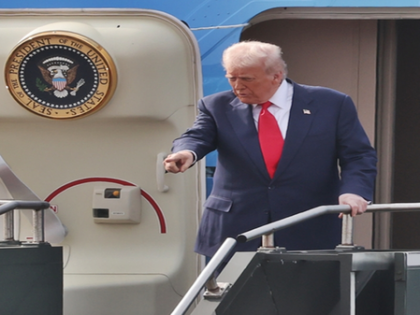Trump's 'Pak testing n-weapons' claim poses grave threat to nations including itself
By IANS | Updated: November 3, 2025 19:40 IST2025-11-03T19:39:30+5:302025-11-03T19:40:09+5:30
New Delhi, Nov 3 If Pakistan is indeed testing nuclear weapons, it poses a grave threat to several ...

Trump's 'Pak testing n-weapons' claim poses grave threat to nations including itself
New Delhi, Nov 3 If Pakistan is indeed testing nuclear weapons, it poses a grave threat to several nations, including itself, considering the volatility it faces against a flailing economy, serious security threats from armed insurgents, and the resurgence of religious radicals in the country.
The shocking revelation came from US President Donald Trump during an interview with CBS News' 60 Minutes on Sunday, where he claimed that Russia, China, North Korea, and Pakistan were all conducting nuclear tests.
"Russia's testing, and China's testing, but they don't talk about it. You know, we're a open society. We're different. We talk about it. We have to talk about it, because otherwise you people are gonna report – they don't have reporters that gonna be writing about it. We do. No, we're gonna test, because they test and others test. And certainly North Korea's been testing. Pakistan's been testing," he said, according to a transcript put out on CBS News website.
The claim does escalate alarm, though there have been no public records to this end. Trump has insisted that "they test way underground where people don't know exactly what's happening with the test”, adding, “You feel a little bit of a vibration.”
Incidentally, during Operation Sindoor, there were some unconfirmed reports that the Indian Air Force (IAF) had carried out precision strikes on Pakistan’s Kirana Hills.
The hilly region near Sargodha Air Base apparently had underground bunkers and missile storage system with a cache of nuclear arms.
Some social media reports and conspiracy posts claimed that the explosions had led to a localised seismic activity equivalent to a magnitude 4.0 earthquake.
These reports were accompanied by interpretations of "satellite and thermal imagery", and speculation about the presence of US and Egyptian aircraft surveying the region for nuclear containment purposes.
However, authorities in India, including top officers of the IAF, had firmly denied any strikes on Kirana Hills, adding that they were not even aware of such a nuclear facility.
The supposed link between reported seismic activity and so-called strikes remains unverified, and there is no confirmation from any official, geological, or military authority that the earthquake was caused by human activity.
But even an outside chance, considering Pakistan’s internal politics and economic strain, makes a covert test risky and destabilising.
Any such action would sharply raise regional tensions, spur an arms race, and provoke global diplomatic and economic fallout.
Any overtures from an army general -- considered "ambitious", and lately spearheading Islamabad’s diplomatic overtures -- in a country historically witnessing civilian government being replaced with military rulers, can prove disastrous.
Pakistan's last known nuclear tests were carried out in May 1998.
Meanwhile, Moscow reportedly carried out a nuclear explosion in 1990, with later activities involving sub-critical or non-yield trials.
However, Russia did test its nuclear-powered cruise missile, the Burevestnik, last month; which some analysts linked to Trump’s interest in similar tests.
China's last acknowledged nuclear test was in 1996, while North Korea's most recent full-scale test was in September 2017.
But just before Trump landed in South Korea on the last leg of his three-nation Asia tour late last month, Seoul’s military establishment had reported detecting multiple short-range ballistic missiles.
The area of launch was said to be from somewhere south of Pyongyang, with the missiles travelling about 350 km towards the northeast. The launch was North Korea’s first ballistic missile tests in five months.
President Trump had expressed his willingness in meeting President Kim Jong Un of North Korea while embarking on his latest tour, which was met was silence from Pyongyang.
Disclaimer: This post has been auto-published from an agency feed without any modifications to the text and has not been reviewed by an editor
Open in app